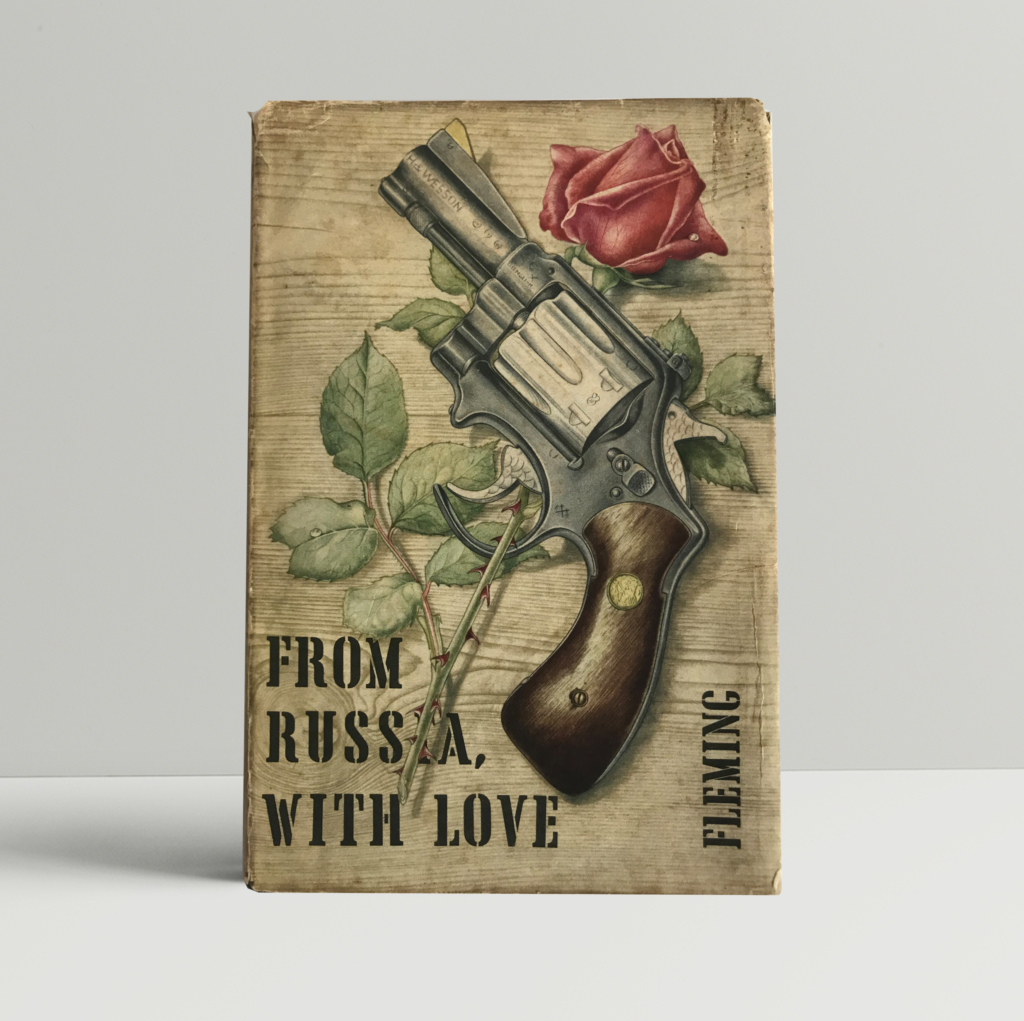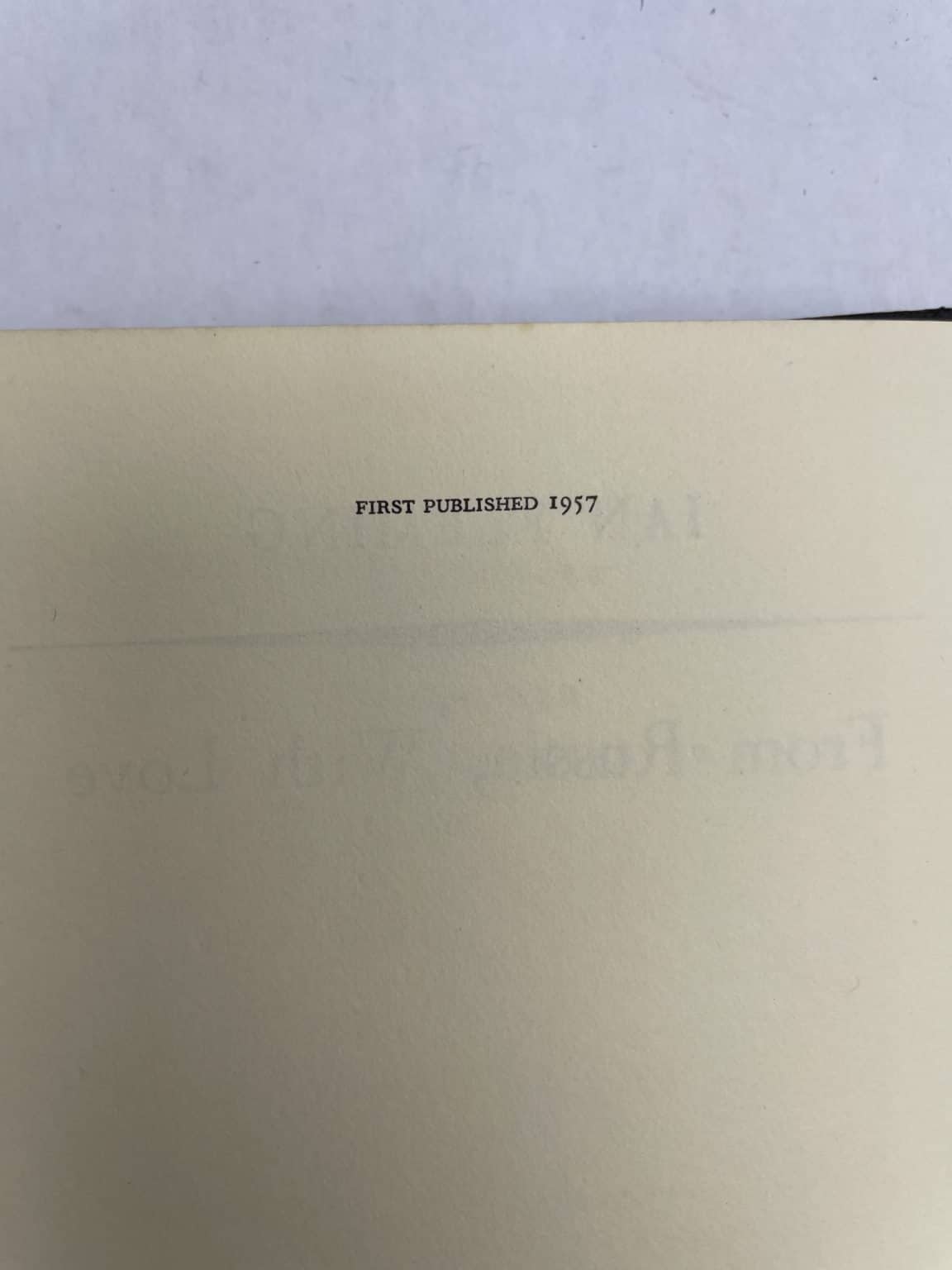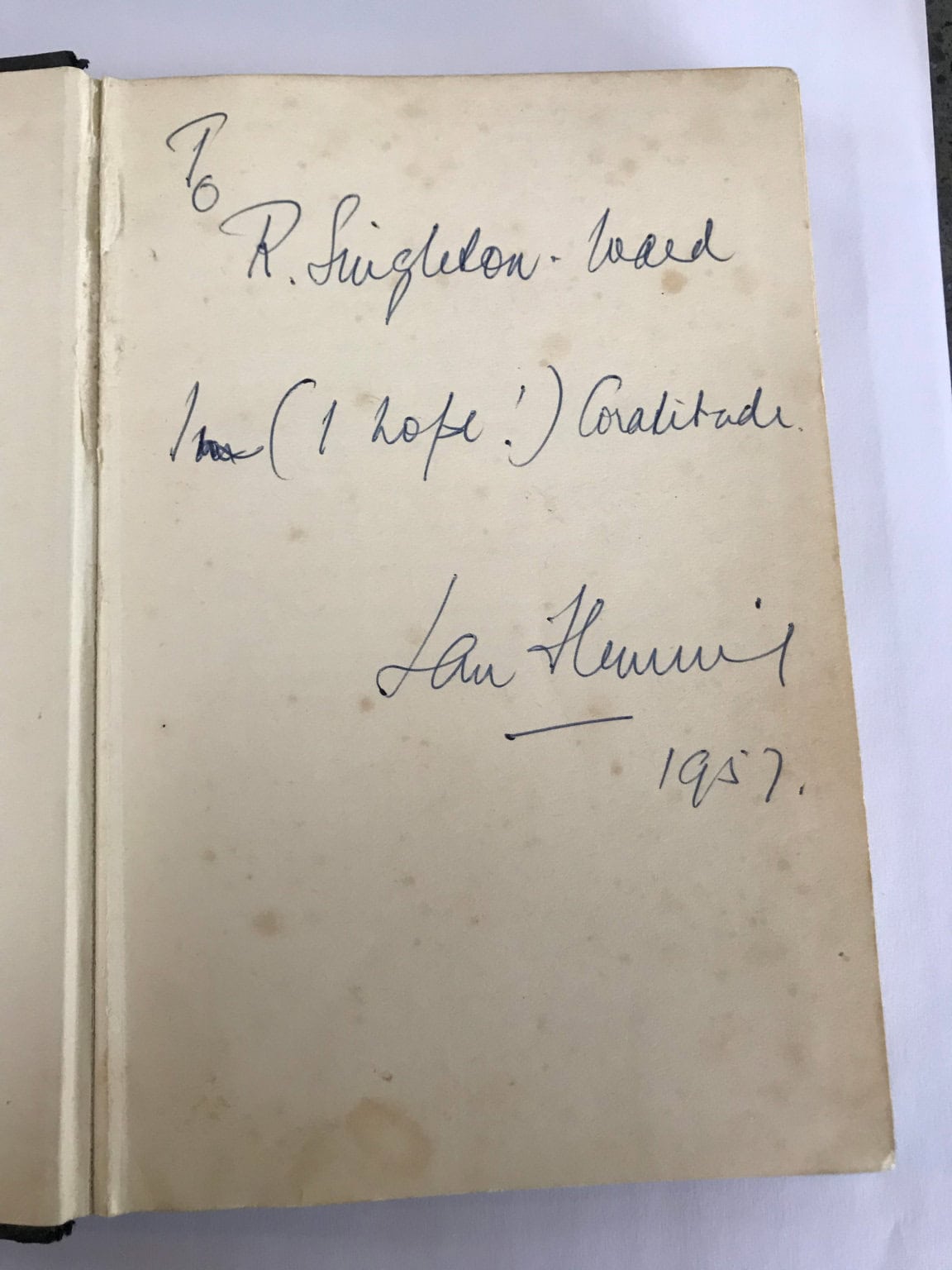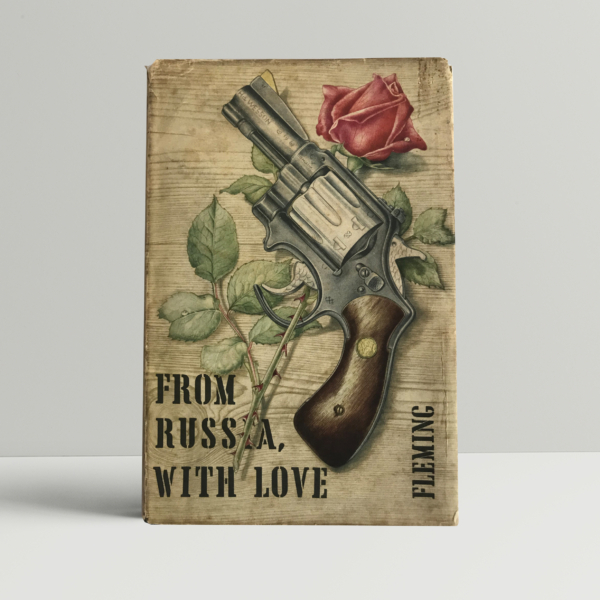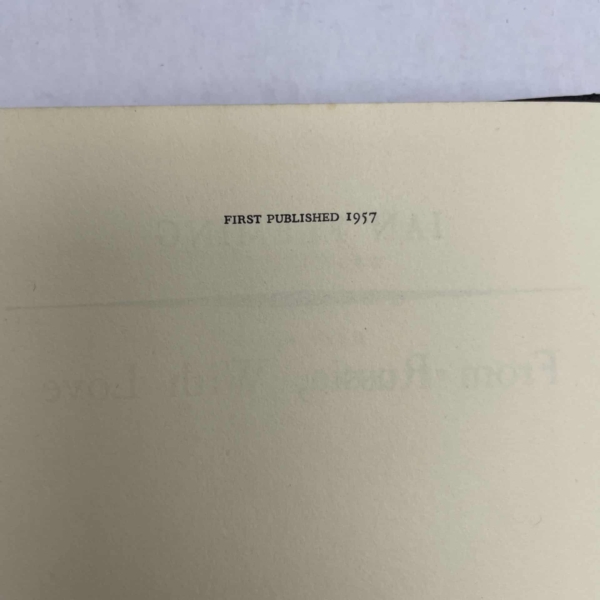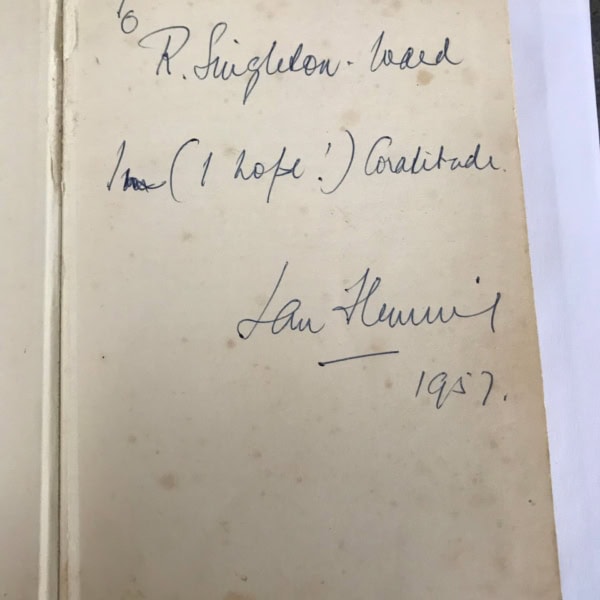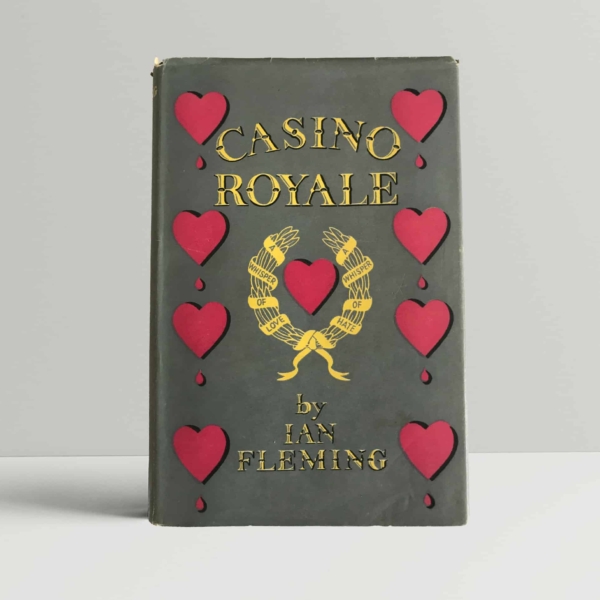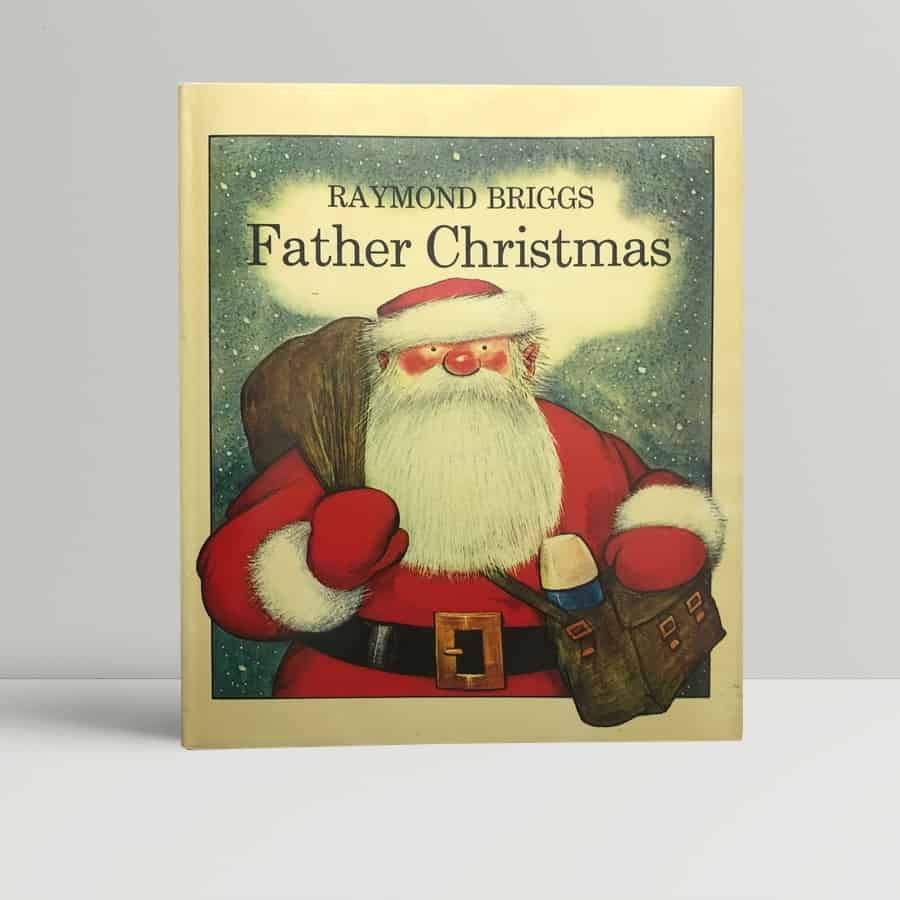Ian Fleming – From Russia With Love – First UK Edition INSCRIBED
£40,000.00
A first edition, first printing of ‘From Russia With Love’ by Ian Fleming published by Jonathan Cape in 1957. A very good book without inscriptions. Bound in the original black boards with silver titles on spine. Red rose and metallic gun to the front board. In the rare dust wrapper. The book has a little spotting within and some wear to the boards and edges. A little spotting to the contents, with a little creasing to the rear board and little cracking to the rear pastedown. The dust wrapper is unclipped and original to the book. Some shallow v-shape loss to the spine ends. Exceptionally rare inscribed. The book is inscribed with the Author’s signed presentation inscription to the front endpaper, ‘To R. Singleton-Ward/ In (I hope)/Gratitude/ Ian Fleming/ 1957’/ The recipient Richard Singleton-Ward: Singleton-Ward was born in Droitwich at the turn of the century and studied as a masseur and physiotherapist in the area and was certainly still operating in the area in the 1940s. Singleton-Ward operated in Harley Street as a specialist physiotherapist in the 1950s and 1960s. This is borne out in his book, ‘My Two Hands Talk’, published by Christopher Johnson in the same year as ‘From Russia With Love’ – 1957. It is possible that Fleming used the book as background (as he had for Patrick Leigh Fermor’s, ‘Traveller’s Tree’ for ‘Live and Let Die’) for the health clinic scenes in the book of ‘Thunderball’, either introduced to the text by a member of the publishing house, or introduced to it by one of the man Harley Street specialists he used to visit. There is a no coincidence perhaps that ‘Thunderball’ (published 4 years later) opens with Bond on the physiotherapist’s table having a massage. It is possible that Singleton-Ward was able to give Fleming some background about this. The association in the presentation inscription suggests they were close or certainly friends. The rare use of Fleming’s full name and date in an inscription (1957) is evidence of this. With the early Bond books, he invariably preferred to use just his Christian name or the more formal “The Author”. Singleton-Ward’s address appears as 46 Portland Place W1 in 1965 (London Phone Book), but no trace after this with no mention after 1965 in the British General Chiropractors register/council. No death is registered in this name also. Generally, it is thought that the success of Bond in the USA was triggered by John F. Kennedy’s love of the character and the novels. The pair met on March 13, 1960. Fleming was visiting his friend, Mrs. Marion Leiter (having used the name for Bond’s American compatriot) in Washington, DC. While Leiter was showing Fleming around Georgetown in her car, she saw the Kennedys walking by. She was due to dine with them that evening. She greeted the promenading Kennedys and asked if she could bring a guest over to dinner that night, telling them that, in fact, he was in her car right now. She introduced the two, Ian Fleming to Senator Kennedy, Senator Kennedy to Ian Fleming. “James Bond?” said Kennedy, “But of course, by all means – do please come.” Fleming would later embellish this first encounter, instead claiming Kennedy said “THE Ian Fleming?” rather than the more recognisable name of his famous protagonist. Not only was Fleming indebted to Mrs. Leiter for this meeting, he owed to her the fact that Kennedy knew Bond at all. Five years earlier, when recovering from back pain, Leiter gave Kennedy a copy of Casino Royale to make his rest a little more exciting. The meeting itself had one particularly memorable episode. During the dinner party, Kennedy asked Fleming how he would depose Fidel Castro, a leader who would prove to be an irritant throughout Kennedy’s short term. The Bond author suggested humiliating Castro out of office. Fleming’s plan involved dropping fake dollar bills to disrupt the value of Cuban currency and distributing pamphlets which claimed that beards attracted radioactivity, which could lead to the impotence of the beard-wearer. Castro and his associates were famously bearded men, but they would now be shamed out of their facial hair. Thus, they’d appear like regular men, argued Fleming. They would either resign themselves, or be forced out by Cubans who realised their leaders were not as invulnerable as they claimed. The tone and intent behind Fleming’s plan has been debated, but it is most likely that he delivered it confidently, and entirely facetiously. Kennedy, renowned for his charm and humour, was amused by Fleming’s ridiculous proposal. Yet neither man could predict that the Kennedy administration would consider similarly ludicrous anti-Castro strategies, with one plot involving exploding seashells and another a poisoned cigar. The relationship between John F. Kennedy and Ian Fleming proved thoroughly beneficial for each. JFK was a great fan of the Bond stories, and listed ‘From Russia With Love’ as number nine among his ten favourite books. Kennedy, if he was ever indebted to Fleming for enjoying his novels, paid it back in abundance. Following Kennedy’s endorsement of From Russia with Love in 1961, Fleming saw the sales of his book skyrocket, and he became the highest-selling crime author in the United States. Fleming wrote in ‘The Spy Who Loved Me’, “We need some more Jack Kennedy’s. It’s all these old people about. They ought to hand the world over to younger people who haven’t got the idea of war stuck in their subconscious.” And in ‘The Man with the Golden Gun’, a novel Fleming began months after Kennedy’s assassination, he depicts Bond relaxing with a glass of bourbon, reading the slain president’s memoir Profiles in Courage. Beyond the boost in sales, John F. Kennedy went on to pay further compliments to the Bond author and his books. He once said he wished he had James Bond on his political team. Journalist Henry Brandon wrote that “Kennedy… was fascinated by the line dividing Ian’s real life from the fantasy life that went into his books. He often asked me how such an intelligent, mature, urbane sort of man could have such an element of odd imagining in his make-up.” He was a Bond fan till the end. It is believed that the last movie Kennedy viewed was From Russia with Love, the night before his death. Without Kennedy’s approval, it is thought that the James Bond literary franchise would have perhaps struggled in the USA. With Kennedy’s approval, not only the literary franchise boomed, but the movie franchise is the success we know today. The book is therefore exceptionally important to the James Bond canon. Presentation copies of ‘From Russia With Love’ are thus exceptionally rare.
(We don't keep all of our stock in the shop, so send us an email if you're planning a trip to see a particular author or book.)
- Description
Description
A first edition, first printing of ‘From Russia With Love’ by Ian Fleming published by Jonathan Cape in 1957. A very good book without inscriptions. Bound in the original black boards with silver titles on spine. Red rose and metallic gun to the front board. In the rare dust wrapper. The book has a little spotting within and some wear to the boards and edges. A little spotting to the contents, with a little creasing to the rear board and little cracking to the rear pastedown. The dust wrapper is unclipped and original to the book. Some shallow v-shape loss to the spine ends. Exceptionally rare inscribed. The book is inscribed with the Author’s signed presentation inscription to the front endpaper, ‘To R. Singleton-Ward/ In (I hope)/Gratitude/ Ian Fleming/ 1957’/ The recipient Richard Singleton-Ward: Singleton-Ward was born in Droitwich at the turn of the century and studied as a masseur and physiotherapist in the area and was certainly still operating in the area in the 1940s. Singleton-Ward operated in Harley Street as a specialist physiotherapist in the 1950s and 1960s. This is borne out in his book, ‘My Two Hands Talk’, published by Christopher Johnson in the same year as ‘From Russia With Love’ – 1957. It is possible that Fleming used the book as background (as he had for Patrick Leigh Fermor’s, ‘Traveller’s Tree’ for ‘Live and Let Die’) for the health clinic scenes in the book of ‘Thunderball’, either introduced to the text by a member of the publishing house, or introduced to it by one of the man Harley Street specialists he used to visit. There is a no coincidence perhaps that ‘Thunderball’ (published 4 years later) opens with Bond on the physiotherapist’s table having a massage. It is possible that Singleton-Ward was able to give Fleming some background about this. The association in the presentation inscription suggests they were close or certainly friends. The rare use of Fleming’s full name and date in an inscription (1957) is evidence of this. With the early Bond books, he invariably preferred to use just his Christian name or the more formal “The Author”. Singleton-Ward’s address appears as 46 Portland Place W1 in 1965 (London Phone Book), but no trace after this with no mention after 1965 in the British General Chiropractors register/council. No death is registered in this name also. Generally, it is thought that the success of Bond in the USA was triggered by John F. Kennedy’s love of the character and the novels. The pair met on March 13, 1960. Fleming was visiting his friend, Mrs. Marion Leiter (having used the name for Bond’s American compatriot) in Washington, DC. While Leiter was showing Fleming around Georgetown in her car, she saw the Kennedys walking by. She was due to dine with them that evening. She greeted the promenading Kennedys and asked if she could bring a guest over to dinner that night, telling them that, in fact, he was in her car right now. She introduced the two, Ian Fleming to Senator Kennedy, Senator Kennedy to Ian Fleming. “James Bond?” said Kennedy, “But of course, by all means – do please come.” Fleming would later embellish this first encounter, instead claiming Kennedy said “THE Ian Fleming?” rather than the more recognisable name of his famous protagonist. Not only was Fleming indebted to Mrs. Leiter for this meeting, he owed to her the fact that Kennedy knew Bond at all. Five years earlier, when recovering from back pain, Leiter gave Kennedy a copy of Casino Royale to make his rest a little more exciting. The meeting itself had one particularly memorable episode. During the dinner party, Kennedy asked Fleming how he would depose Fidel Castro, a leader who would prove to be an irritant throughout Kennedy’s short term. The Bond author suggested humiliating Castro out of office. Fleming’s plan involved dropping fake dollar bills to disrupt the value of Cuban currency and distributing pamphlets which claimed that beards attracted radioactivity, which could lead to the impotence of the beard-wearer. Castro and his associates were famously bearded men, but they would now be shamed out of their facial hair. Thus, they’d appear like regular men, argued Fleming. They would either resign themselves, or be forced out by Cubans who realised their leaders were not as invulnerable as they claimed. The tone and intent behind Fleming’s plan has been debated, but it is most likely that he delivered it confidently, and entirely facetiously. Kennedy, renowned for his charm and humour, was amused by Fleming’s ridiculous proposal. Yet neither man could predict that the Kennedy administration would consider similarly ludicrous anti-Castro strategies, with one plot involving exploding seashells and another a poisoned cigar. The relationship between John F. Kennedy and Ian Fleming proved thoroughly beneficial for each. JFK was a great fan of the Bond stories, and listed ‘From Russia With Love’ as number nine among his ten favourite books. Kennedy, if he was ever indebted to Fleming for enjoying his novels, paid it back in abundance. Following Kennedy’s endorsement of From Russia with Love in 1961, Fleming saw the sales of his book skyrocket, and he became the highest-selling crime author in the United States. Fleming wrote in ‘The Spy Who Loved Me’, “We need some more Jack Kennedy’s. It’s all these old people about. They ought to hand the world over to younger people who haven’t got the idea of war stuck in their subconscious.” And in ‘The Man with the Golden Gun’, a novel Fleming began months after Kennedy’s assassination, he depicts Bond relaxing with a glass of bourbon, reading the slain president’s memoir Profiles in Courage. Beyond the boost in sales, John F. Kennedy went on to pay further compliments to the Bond author and his books. He once said he wished he had James Bond on his political team. Journalist Henry Brandon wrote that “Kennedy… was fascinated by the line dividing Ian’s real life from the fantasy life that went into his books. He often asked me how such an intelligent, mature, urbane sort of man could have such an element of odd imagining in his make-up.” He was a Bond fan till the end. It is believed that the last movie Kennedy viewed was From Russia with Love, the night before his death. Without Kennedy’s approval, it is thought that the James Bond literary franchise would have perhaps struggled in the USA. With Kennedy’s approval, not only the literary franchise boomed, but the movie franchise is the success we know today. The book is therefore exceptionally important to the James Bond canon. Presentation copies of ‘From Russia With Love’ are thus exceptionally rare.

